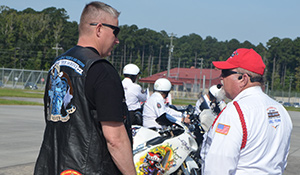
By CSM Leeford C. Cain
 Safe driving or riding doesn’t just happen. It’s a byproduct of receiving the right training and education, exercising self-discipline, meeting standards and assessing one’s ability to execute a given task.
Safe driving or riding doesn’t just happen. It’s a byproduct of receiving the right training and education, exercising self-discipline, meeting standards and assessing one’s ability to execute a given task.
Since I spoke those words a little more than a month ago, we have closed out another fiscal year. And while accidental losses continue to trend downward, we’re still missing 129 Soldiers from our formations due to incidents that could have been prevented. Of that total, 75 percent of those fatalities resulted from off-duty privately owned vehicle accidents. That tells me that we still have a long way to go. We’re simply not doing enough when we allow even one Soldier to be lost because of a senseless, careless disregard of safety protocols.
We’re conditioned to expect the loss of life on the battlefield, but losing a Soldier during a weekend at home, when he or she should be enjoying time and camaraderie with their friends and families, is a needless tragedy. I think of the young child growing up without a father or mother, and the spouse having to pick up the pieces alone to raise that child. I see that young squad leader trying to understand where he or she went wrong, and who must now fill that void in the ranks and complete the mission. Did we do enough? Did we fail the Soldier and his or her family?
What do you tell the unit commander, who’ll notify the family and answer their questions about why this Soldier died. How do you explain that their loved one died simply returning to the barracks after a night of partying with “buddies?” Weren’t these the same battle buddies that watched over each other while deployed? Why didn’t that continue at home station? Where, as leaders, peers and family members, did we fail this Soldier?
From day one, the Army teaches Soldiers those values of loyalty, duty, respect, selfless service, honor, integrity and personal courage; loyalty to support and to stand up for leaders and fellow Soldiers alike; duty to fulfill your obligations to the mission, the unit, family and peers; respect for others and to put forth your best effort; selfless service, placing the welfare of the nation, the Army and your subordinates before your own; honor to carry out, act and live the Army values; integrity to do what is legal and morally right; and personal courage to face fear, danger or adversity (physical or moral) to continue on the right path.
Those values are again reinforced through the NCO Creed in which NCOs declare their two basic responsibilities – “accomplishment of my mission and the welfare of my Soldiers.”
We have our challenges. Every weekday after 5 p.m., on weekends and holidays, Soldiers often leave behind those tools that will keep them safe. No longer directly supervised by unit leaders, these Soldiers hit the bars, beaches and sometimes head home after an especially long and trying week. Some get drunk and careless or take unnecessary risks like driving too far without adequate rest or route planning. Many of these Soldiers later pay with their lives for their indiscipline and their lapse of judgment.
So how do we reach that Soldier?
You’ve heard it all before. Get actively involved. Teach, coach and mentor that Soldier to do what is right both on and off duty. We owe it to ourselves and, more importantly, to that Soldier.
We also ask and encourage families to get actively involved. Steady their Soldier’s hand and impress upon them how important they are to the family and nation. Make sure they’re rested and trips are well planned with adequate stops for rest, food and fuel. Inspect and ensure that their vehicles are well-maintained and can be safely driven before taking those long trips to and from home.
Understandably, families may be anxious to see their loved one, especially after a long absence, but remember it’s still more important that they see their Soldier alive. It is our duty and commitment to those families whose sons and daughters have joined our ranks and have pledged to dutifully serve and protect our nation’s freedoms and way of life. Together, we can reduce these accidental losses of life.
Army Safe is Army Strong!
CSM Leeford C. Cain is the command sergeant major of the U.S. Army Combat Readiness/Safety Center at Fort Rucker, AL.
Caption: SSG Jimmy Robinson, brigade motorcycle mentor assigned to HHC, 3rd CAB, discusses motorcycle procedures with a member of the demonstration team during a brigade motorcycle safety day on Hunter Army Airfield, GA, Oct. 9.
Credit: U.S. ARMY PHOTO BY CPT CHAD ASHE, 3RD CAB PAO







